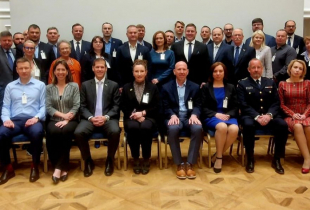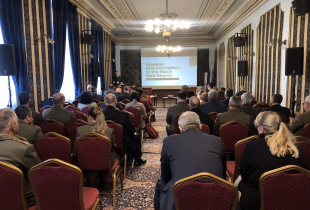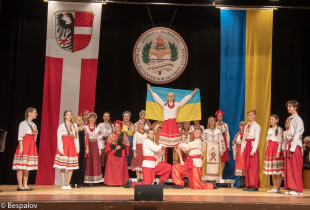
“Libya – quo vadis?”
By Katrin Bastian & Benjamin P. Nickels
College of International and Security Studies
George C. Marshall European Center for Security Studies
On Dec. 15, the European Security Seminar South hosted a 90-minute virtual event on the Mediterranean Civil Society Network series. The event takes place three times a year. The last iteration focused on political developments in Libya and included two subject matter experts: Dr. Stefano Marcuzzi, adjunct fellow at the University College Dublin, and senior analyst at the consultancy group Libya Analysis LLC, and Tarek Megerisi, senior policy fellow with the North Africa and Middle East program at the European Council on Foreign Relations. Titled “Libya – quo vadis?” the event aimed at analyzing Libya’s current internal dynamics and the relation to external actors, to reflect on the roles of both NATO and the EU in the Libyan conflict, and to identify possible future paths for the country’s development.
A country divided
Currently, Libya is still a divided country, with two competing governments based in Tripoli and Sirte. Over 800,000 people—out of some 7 million living in the country—are in desperate need of humanitarian assistance. On top of that, an unknown number of migrants, possibly up to 600,000, are stuck in inhuman detention centers along Libya’s coast, where they suffer well-documented abuses.
With support by the United Nations and the international community, a ceasefire agreement was signed in 2020 following the successful defense of Tripoli against Khalifa Haftar’s forces. In a bid to advance the peace process, the United Nations convened the “Libyan Political Dialogue Forum” in late 2020 with 75 Libyans from across the country’s diverse social and political spectrum. The forum adopted a road map envisioning a new transitional phase of 18 months, to be led by a newly selected presidency council and a government of national unity. It would have culminated in the holding of simultaneous presidential and parliamentary elections on Dec. 24, 2021.
However, because a framework for these elections could never be agreed upon, the elections were postponed. One year later, Libya is still divided into East Libya, with the House of Representatives in Sirte building the power base of former Interior Minister Fathi Bashaga, and West Libya with Tripoli-based Prime Minister Abdulhamid Dabeiba.
Lessons learned from the NATO intervention and EU engagement
Looking back after a decade, with Libya still in crisis, large numbers of Libyans displaced, and migrants moving though the territory, it is difficult to see much success in NATO’s 2011 intervention in the country. NATO was a somewhat hesitant player in Libya, drawn into action by key allies, running its activities through parallel structures, and uncertain how to interpret its no-fly zone mandate. While the military execution of Operation Unified Protector could rely on NATO’s command and control structure, the alliance was split politically. As a consequence, political direction of the operation was given not to the North Atlantic Council, but to the Libya Contact Group, made of delegates of the countries participating in the coalition, including NATO members and non-NATO members like Qatar and the United Arab Emirates. One of the key problems was that individual members of the Libya Contact Group invested training and equipment into some Libyan rebel factions bilaterally, thereby strengthening peripheral forces in Libya at the expense of the authority of the National Transitional Council at the time.
The European Union, for its part, has faced difficulties in implementing its support programs due to the precarious security situation on the ground, the lack of effective institutions within the fragile Libyan state that would be able to absorb and process EU programs, and the difficulty of ensuring funding in the intended manner. To date, the Union has invested 44.5 million Euros in humanitarian assistance in Libya, it is contributing to 23 projects worth 70 million Euros in bilateral support, and has financed the COVID-19 response in Libya with 66 million Euros. Additionally, 408 million Euros have been mobilized under the EU Emergency Trust Fund for Africa to help Libya cope with the migration challenge. And yet the proper implementation of some of these soft power tools has ultimately suffered from an inability of the EU to use hard power in decisive moments of its crisis management and to claim visible EU agency. Its naval operations, European Naval Forces Mediterranean Sophia and Irini, suffered from self-imposed limitations that impeded a strategic impact. One such shortcoming was the EU’s acceptance to keep Operation Sophia out of Libya’s territorial waters, thereby limiting its operational effectiveness.
Operation Irini—launched in Mar 2020 and extended until Mar. 31, 2023—has been of some value by providing intelligence and information on developments in Libya, particularly with regards to human smuggling and trafficking. In sum, however, NATO and the EU had announced bold commitments but brought compromised means to the table in Libya. A cautious NATO could not truly empower or ensure the defense and security sectors in Libya, which has left EU soft power vulnerable and exposed to insecurity and disruption. With these multilateral bodies stumbling, a disappointing lesson for Libya became the primacy of unilateral action, which has been the approach of several external actors since.
Libya’s internal divisions
Libya is no longer in the headlines, but the sense that the country is experiencing a boring status quo or stagnation overlooks some ominous developments under the surface. Libya remains in the grip of a handful of powerful Libyan elites who are settled into different political structures and effectively holding the country hostage. They are gaming political processes to gain more control for themselves over the executive and key institutions, locked in a zero-sum logic that is damaging to the country’s future. Haftar has been marginalized within this competition since the failed offensive on Tripoli in 2020. Sanctions have had limited impact on the elites, meanwhile, because sanctions are primarily effective in shaping or changing very specific explicit behaviors, not forcing elites to act as responsible statesmen overall.
Civil society has been weakened in Libya. Laws have been passed to punish civil society actors for engaging with non-Libyan actors. The Nicosia Initiative, launched at the plenary session of the Euro Mediterranean Assembly of Regional and Local Authorities in Nicosia in 2016, is the European Committee of the Region’s platform aimed at strengthening local administrations in Libya. It is also an important framework to support and develop civil society but remains underfunded and operates in a difficult political and security environment.
External actors
External actors remain major powerbrokers in the Libyan landscape. Turkey is the standout power in Libya ever since Tripoli’s victory in the war against Haftar’s forces, but Turkey’s relations with Dabaiba do face some troubles. Egypt has been unable to achieve its lofty ambitions of influence in Libya, while Russia’s role has been reduced by Haftar’s failings and the demands created by the Ukraine war. The UAE’s support for Haftar peaked in 2019 and 2020, but Abu Dhabi’s foreign policy has become more pragmatic since Dabaiba took power in Tripoli in March 2021 and since its signing of the Abraham Accords. Following the civil war and the NATO intervention in 2011, Qatar funded and supported different militias inside Libya. A close partner of Turkey, Qatar recognized the UN-backed government in Tripoli. However, in September 2022, the Speaker of the Libyan House of Representatives in East Libya, Aguilah Saleh, traveled to Doha to meet with Qatari Emir Al Thani. The mere fact of this visit suggests a change in Qatari-Libyan relations toward more openness to Eastern Libyan concerns.
Also, in September, the United Nations appointed Abdoulaye Bathily of Senegal as the new Special Representative of the Secretary-General for Libya and Head of the UN Support Mission, the eighth UN representative to attempt to negotiate a way out of Libya’s governance crisis since 2011. His room for maneuver remains to be seen. So far, Bathily has struggled to initiate a strong policy or approach to the crisis. Negotiating in a divided country with institutional leaders who have exceeded their respective mandates and lack electoral legitimization will make Bathily’s mission extremely difficult at a time when the UN Security Council is deeply split over the Ukraine war.
Elections finally?
Elections have become overinvested with importance in today’s Libya. Elections have been evoked so often as the path out of the crisis and toward a brighter future that the Libyan population awaits elections in order to move forward. That said, there are major logistical challenges to conducting elections in a divided environment with major population displacements and without elite political support for them. Elections have been delayed for more than a year due to these challenges, and in reality, political elites are neither preparing for elections nor intending to compete for political power through them. Ideally, elections could be held with clear rules agreed upon by all parties, with approved methods for contesting the outcome and stiff sanctions for anyone attempting to spoil the results, but Libya’s politics are far from this goal. Meanwhile, many Libyans have simply now adjusted to the new normal of a divided country and incompetent elites. Crisis have become something of the norm in Libya.
The impact of the Ukraine War
The war in Ukraine is having important impacts on Libya. It has reduced the international community’s attention to the country, and it has reinforced the stalemate on the ground, since Haftar cannot launch any offensive while a weakened Russia needs its forces for Ukraine. Like other states in Africa and particularly North Africa, Libya has suffered from the inflation, food shortages and fertilizer expenses resulting from disrupted grain and gas exports. But Europe’s need to substitute for oil and gas supplies may make Libya an important partner, and perhaps a battleground, in the coming months and years.
Libya – quo vadis?
As long as various political elites are able to mobilize different factions, sectors, and regions and remain protected by myriad militias, they will see no existential need to reconcile and unify the country, meaning there is little hope for any political solution soon. Libya’s history of the last decade has shown that even established and experienced multilateral institutions like NATO, the EU and the UN cannot succeed in supporting Libya’s emergence from conflict if the political will for unity and peace is lacking internally.


